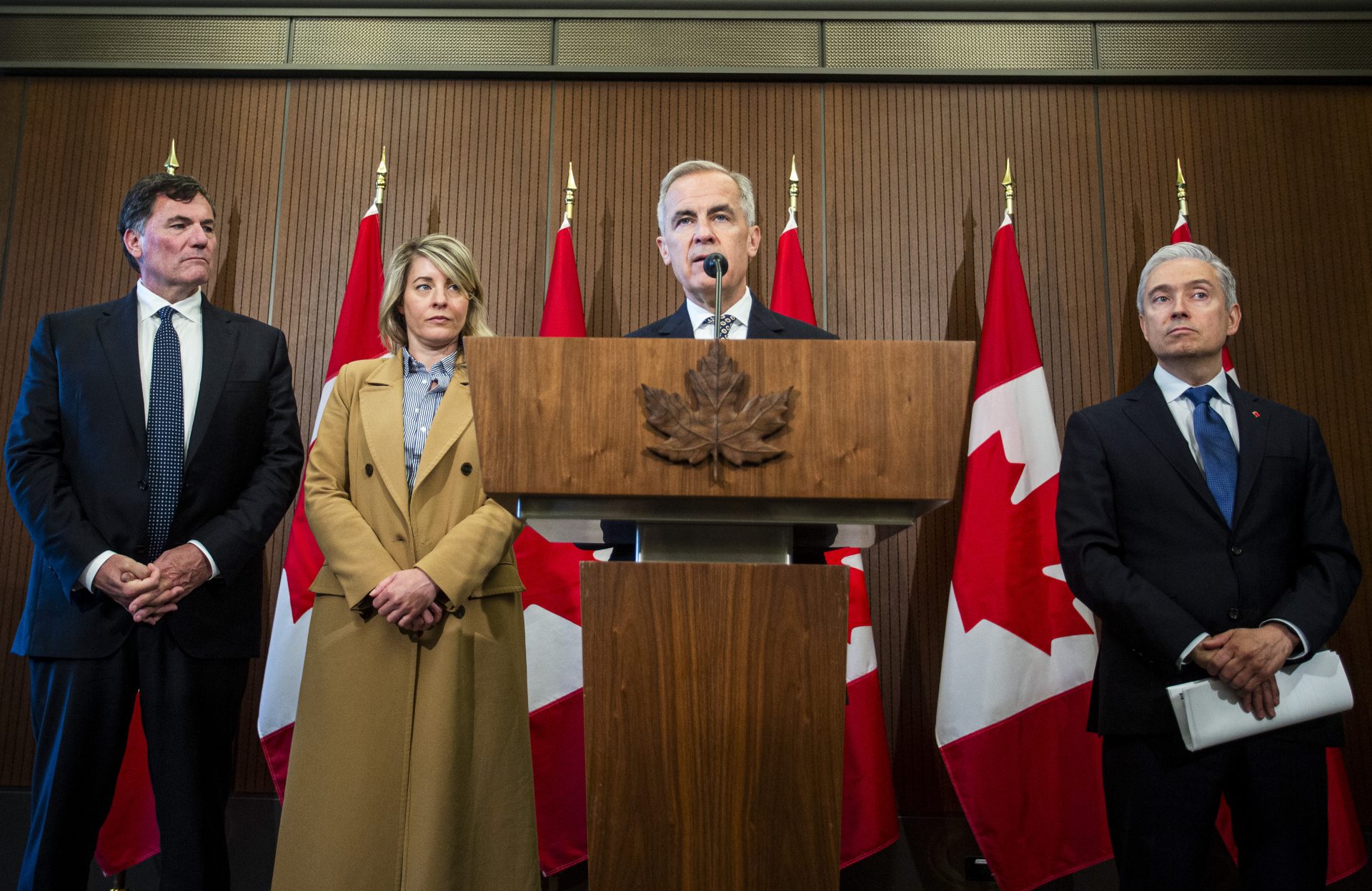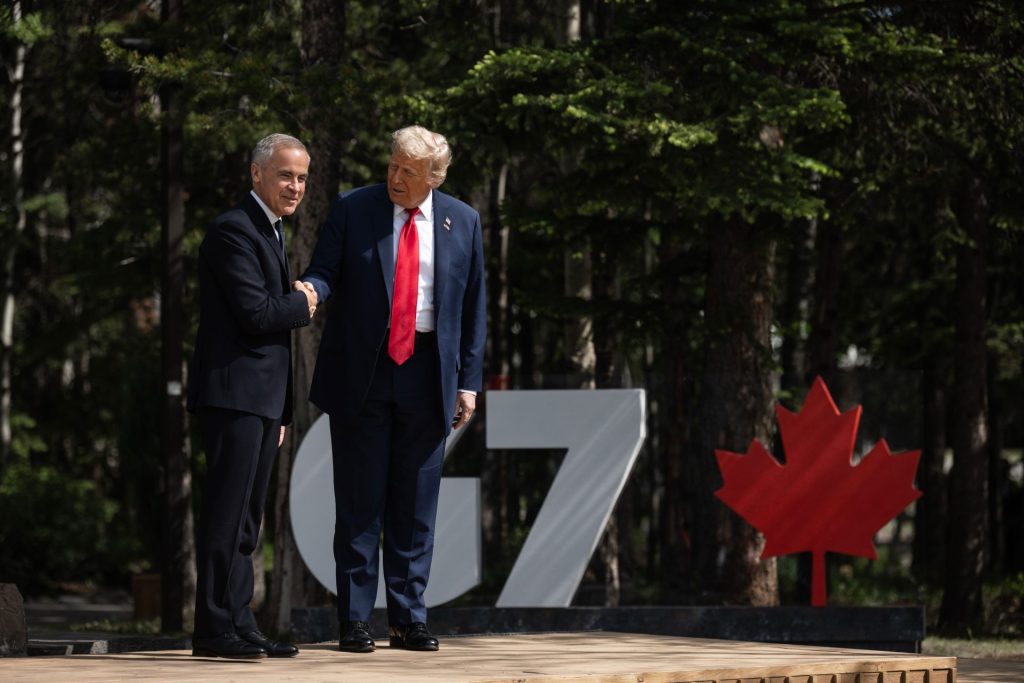Digital services tax retreat risks showing ‘Canada will fold’ in Trump trade talks, warn experts

The Liberal government’s 11th-hour withdrawal of a controversial tax legislation, that was set to bring in billions of dollars from multinational tech giants, is a capitulation that was years in the making, economists and digital experts say.
“This has been a source of friction for a number of years,” Michael Geist, a law professor at the University of Ottawa and Canada Research Chair in internet and e-commerce law, told The Hill Times. “It’s reached a boiling point now, but it’s sort of always been simmering.”
While that may not be a good enough reason to quash tax legislation on its own, “it is at least reason enough to realize that it was going to raise some real sensitivities and trade friction,” said Geist, both under former U.S. president Joe Biden and under current president Donald Trump.
Set to come into effect on June 30, the digital services tax, or DST, applied a three-per-cent tax on revenue above $20-million earned from digital services that rely on engagement, data, and content from Canadian users, as well as the sale or licensing of some Canadian user data. Payments were slated to be retroactive to 2022, with billions of dollars anticipated to be paid by tech giants like Meta, Google, and Airbnb.
Other Trudeau-era digital legislation, like the Online News Act, were “arguably about levelling the playing field” among tech giants, Geist said, but the rationale for the DST was more straightforward: “This was just about the billions of dollars the government was hoping to get through this tax measure.”
Richard Forbes, principal economist at the Conference Board of Canada, said the tax was the Canadian government’s attempt at closing what they saw as a tax loophole, as American firms were operating in this country without paying tax to the government.
“If a company from another country is operating, selling goods to people in your country, you can see that it should be taxed,” he said. “The line becomes more fuzzy when it’s digital.”

First announced in 2020, the legislation has been a thorn in the side of Canada-U.S. relations for years, long before Trump took office for his second term and threatened to annex Canada as the 51st state. A 2023 letter from U.S. lawmakers from both sides of the aisle denounced the tax as an “unusually aggressive and discriminatory approach” that would “target U.S. companies and workers who would disproportionally bear the burden of this new tax.”
The tax was a convenient battering ram in the latest chapter of the protracted trade war between the U.S. and Canada, with Trump using the impending levy as a reason to cancel trade negotiations on June 27, and threatening again to hit some Canadian products with hefty tariffs. Two days later, Ottawa responded by dropping the DST, with a 10 p.m. press statement on June 29 from Finance Minister François-Philippe Champagne (Saint-Maurice—Champlain, Que.) saying Canada is “leading complex negotiations” with the U.S. The statement said Prime Minister Mark Carney (Nepean, Ont.) “has made it clear that Canada will take as long as necessary, but no longer, to conclude this agreement.”
The tax, Champagne said, would be cancelled “in anticipation of concluding a mutually beneficial comprehensive trade agreement with the United States.”
It was a move Carney defended as key in resuming trade talks, telling reporters negotiations had re-started as of June 30, with an eye to the July 21 deadline that was agreed to during the G7 meeting in Kananaskis, Alta.

Vivek Dehejia, a professor of economics at Carleton University, said the intent of the levy was for Canadians to benefit from the profits of “invisible” services in the digital realm that go untaxed.
“Having said that, in a country like Canada which is already highly taxed compared to other G7 countries, is another tax what we need to jumpstart productivity, growth, jumpstart the economy?”
Canada is already “languishing” compared to other G7 nations, Dehejia said, something Carney has pledged to tackle in his fight to reinvent the domestic economy.
While the DST would have remitted potentially billions of dollars from tech giants, Dehejia said the burden would likely not have been borne by the monopolistic firms, but the cost would have been passed on to consumers who have little choice but to use the tech giants’ services, since there are few competitors.
“Basic economics and common sense tells us they would have passed on much of the tax to consumers here in Canada,” he said.
“So this headline idea that we were going to be soaking these companies for billions, whoever said that doesn’t understand basic economic tax incidence theory,” he said. “It’s right out of the first chapter of the economics textbook. The reality is it would pass on the tax to us, and we’d be the ones left holding the bag.”
Carney, Dehejia said, could have “drawn a line in the sand” when he first became prime minister and done away with the tax before it became a lightning rod in trade negotiations.

“The way it was handled was, in my opinion, very damaging,” he said. “In terms of the bargaining relationship, … all it does is reconfirm to Trump and the people around him [that] if Trump threatens Canada, and that threat is seen as credible, he’ll get his way, and Canada will fold.”
Asked if Canada received anything in return for rescinding the DST, Carney told reporters the tax is “part of a bigger negotiation” and was a question of timing in the talks.
“It doesn’t make sense to collect tax from people and then remit them back,” he said. “So, it provides some certainty.”
Carney promptly ended a June 30 press conference after taking just one question, and didn’t address queries about White House Press Secretary Karoline Leavitt’s comments that Carney “caved” to Trump’s pressure and that the president “knows how to negotiate.”
Dehejia says in the end there’s “no harm done” to Canadians since the tax didn’t come into effect, but it could leave a lasting impression on negotiations.
“My sense is, in any future negotiations, it will be at the back of the minds of Americans, that if we push them hard enough, Canada will bend to what we want,” he said.
Adam Taylor, president of Export Action Global, agreed that the DST had been in America’s crosshairs for months.
“It’s a tossup. Everyone has an opinion on if it was a good, strategic tactical move right now, or do you hold it for later? But ultimately, I think it keeps negotiations on track,” he said.
Every aspect of the negotiations will be scrutinized, but just getting back to the negotiating table is a positive, he said.
“Anything that leads to an outcome that preserves, to the greatest extent possible, our duty-free access to the U.S. market, that is the long-term goal.”
The Hill Times






 LICENSING
LICENSING PODCAST
PODCAST ALERTS
ALERTS













